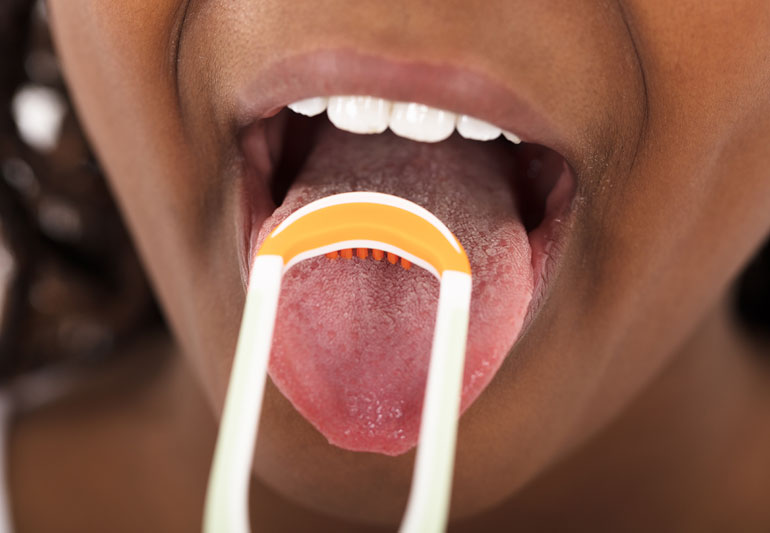

Even if you’re an oral hygiene all-star who brushes your teeth twice a day, flosses regularly and dutifully visits your dentist every six months, you may still be missing one step that could help keep your mouth fresh and healthy.
Have you thought about tending to your tongue – that fleshy collection of muscles that helps you speak, chew and swallow? It’s covered in little bumps called papillae that allow you to taste and feel textures in your mouth.
“But your tongue can also harbor bacteria,” dental hygienist Tenika Patterson, RDH, explains.
While most of those bacteria are the “good kind” that foster a healthy environment in your mouth, other kinds can cause bad breath, tooth decay and gum infections.
So, cleaning your tongue is important to keep that bad bacteria, as well as food debris and dead cells that may accumulate there, from causing trouble.
How to clean your tongue
Brushing your tongue gently from back to front a few times with a toothbrush and toothpaste is an easy first step, since you’re already in there brushing your teeth twice a day anyway.
“But tongue scraping can do a better job at removing that plaque and bacteria off the tongue’s surface,” Patterson advises.
“Brushing is OK to do, but think about it this way — if your carpet is dirty and you scrub it, the dirt’s going to get embedded down in there,” she explains. “But if you scrape it, it’s going to come right off the surface.”
Tongue scraping Vs. Brushing
Indeed, studies suggest that tongue scraping can remove bacteria and improve bad breath more than brushing.
Tongue scraping devices made from plastic, copper or stainless steel are available at most drug stores and generally cost under $10.
The benefits of tongue scraping
Although it may not be top-of-mind, taking care of your tongue is important for overall oral health. Some of the benefits of tongue scraping are:
- Improved taste. When you scrape off the surface of your tongue, it’s almost as if you’re starting with an entirely fresh palette. See if you notice stronger flavor profiles the next time you whip up something sweet or spicy!
- Fresher breath. So much odor-causing bacteria lives on your tongue. It’s not just your teeth and gums you need to pay attention to in order to avoid bad breath — your tongue is a big part of it!
- Improved overall health. Taking good care of your oral hygiene is essential to your overall well-being. Scraping your tongue can remove harmful bacteria that inflames your gums as well as prevent cavities. When these best practices for proper oral hygiene are ignored, they can lead to other issues like heart disease, cancer and more.
Brush, floss and scrape
Here’s how to add tongue scraping to your routine in the morning and at night.
Brush your teeth, floss and rinse like you normally would. Then, stick your tongue out and apply light pressure to run the scraper across the entire surface of your tongue once or twice, starting all the way at the back of the tongue and scraping toward the front. It shouldn’t hurt or do any damage to your tongue. If it does, you’re pressing too hard on the scraper, so use less pressure.
Rinse the scraper in warm water after each pass, and finish by rinsing it again and swishing your mouth out with water.
It’s a quick and simple last step to add to your oral hygiene routine, but it can help leave your mouth feeling squeaky clean. If your tongue gives off any visual clues that it’s not healthy — like white, black or red discoloration, or sores or pain that persist for more than two weeks – make an appointment to visit and consult with your dentist.
more recommended stories
 Anxiety Reduction and Emotional Support on Social Media
Anxiety Reduction and Emotional Support on Social MediaKey Summary Anxiety commonly begins in.
 Liquid Biopsy Measures Epigenetic Instability in Cancer
Liquid Biopsy Measures Epigenetic Instability in CancerKey Takeaways Johns Hopkins researchers developed.
 Human Antibody Drug Response Prediction Gets an Upgrade
Human Antibody Drug Response Prediction Gets an UpgradeKey Takeaways A new humanized antibody.
 Pancreatic Cancer Research: Triple-Drug Therapy Success
Pancreatic Cancer Research: Triple-Drug Therapy SuccessKey Summary Spanish researchers report complete.
 Immune Cell Epigenome Links Genetics and Life Experience
Immune Cell Epigenome Links Genetics and Life ExperienceKey Takeaway Summary Immune cell responses.
 Dietary Melatonin Linked to Depression Risk: New Study
Dietary Melatonin Linked to Depression Risk: New StudyKey Summary Cross-sectional analysis of 8,320.
 Chronic Pain Linked to CGIC Brain Circuit, Study Finds
Chronic Pain Linked to CGIC Brain Circuit, Study FindsKey Takeaways University of Colorado Boulder.
 New Insights Into Immune-Driven Heart Failure Progression
New Insights Into Immune-Driven Heart Failure ProgressionKey Highlights (Quick Summary) Progressive Heart.
 Microplastic Exposure and Parkinson’s Disease Risk
Microplastic Exposure and Parkinson’s Disease RiskKey Takeaways Microplastics and nanoplastics (MPs/NPs).
 Sickle Cell Gene Therapy Access Expands Globally
Sickle Cell Gene Therapy Access Expands GloballyKey Summary Caring Cross and Boston.

Leave a Comment